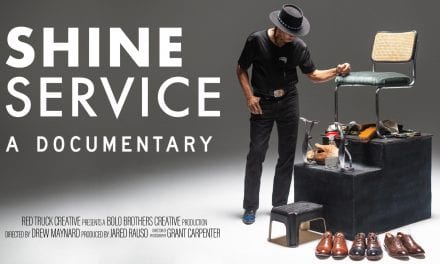Hafta Have Helps Brick-and-Mortar Stores Gain on Otherwise Lost Sales
If you consider an unfinished sale a “lost transaction,” then there are some titanic numbers to crunch. Amanda Latifi, the co-founder and CEO of the omnichannel shopping platform Hafta Have, says that the incomplete sales for online shopping amount to more than $4 trillion lost every year. The phenomenon is known as “cart abandonment,” and it’s an ogre that she says casts an even larger shadow for physical sales lost—$9 trillion a year!

Amanda explains that even though there’s an obscene amount of money to be made, a lot of brick-and-mortar retailers don’t seem to know about it. She says, “If you’re shopping in-store as a shopper, and you go in and you look at something and you touch it, and try it—and maybe even go all the way to the dressing room to try it on—unless you make that purchase, you’re a ghost to the retailer. They have no idea that you were even in the store.”
Amanda continues, noting that Hafta Have is “a hybrid solution” of convenience and incentive to the customer. For the retailer, it’s an “offline revenue engine” that opens a dataset they typically wouldn’t be able to access. Hafta Have is convenient in that users may create a physical shopping wishlist so that they remember the item for a later visit. However, Hafta Have is also a tool for incentivizing the customer. For example, Hafta Have’s users can take a picture of a price tag of an item that they’re considering for purchase, and text it to a shortcode to unlock exclusive offers. Hafta Have texts the user back the item’s image without needing an app profile or requesting them to login with a password. If the shopper clicks “buy,” they are directed back to the product’s e-commerce page. The retailer can then collect real-time data, including the time when the item was looked at, the person’s phone number, the specific item considered for purchase, and whether or not it was purchased. Retailers can also communicate to the consumer on a level specific to the product (e.g. with a coupon) to encourage or incentivize the customer to make the purchase.

That customized shopping experience has made Hafta Have a weapon for businesses looking to compete with Amazon. Amanda says that moving the customer directly into the retailer of origin’s sales funnel helps businesses keep a one-on-one relationship. Without divulging too many details, Amanda shares that she’s currently in conversation with a major business entity to give them an edge in the world of e-commerce. This is due partly to Hafta Have’s success metrics, which include a 99 percent open rate, a 35 percent click-through rate, and 10 to 50 times the ROI.
Like some other pieces of mobile technology, the idea of treating it like a game makes using Hafta Have a more pleasurable experience. Amanda states, “So there’s just been some really interesting strategies we’ve been able to bring to this to have been able to take the fun, you know, cause people do love saving money. People love talking about how, you know, ‘I just saved $50, or a $100.’ So that’s, that’s always a great feeling.”
A major case study for the gamification component was the campaign for the South American sunglasses and eyeglasses retailer Chilli Beans. Without using a single sale sign, Hafta Have was able to lift sales by 11 percent. Amanda says, “At Christmas, when every store says, ‘Come inside! 40 percent off.’…they didn’t have a single sale sign….This is essentially the only store without a sale sign [in the mall]. It was this entire promotion of ‘unwrap secret savings.’ So you went in, you took a picture of a tag, you texted, and you unwrapped an exclusive offer. And… we had six offers that we were just rotating through. but they were always delivered against the product you interacted with. So, you felt like you were getting something special. So, it would be like, ‘Congrats! Buy the Elvis Presley glasses today and get a free gift for purchase!’ And it was just like you got a sunglasses case. Or it was, ‘Congrats! Buy the red-faced watch and get 25 percent off a pair of sunglasses!’… It felt like a game and not everyone was getting the same offer. So you really did feel like you won something.”
Another case study on their website came from a partnership with Starbucks. The case study asks the question, “How do you capture a shopper’s attention in a place like Las Vegas and encourage them to engage and purchase a specific product?” Over a period of 30 days, Hafta Have delivered a 400 times increase in product engagement, a 67 percent lift in offer redemption, a 25 percent conversion (leading to a purchase) of those shoppers who engaged with the program, and a doubling of the average size of the customer’s tab.
Amanda says that Hafta Have’s strength as a startup was recently recognized by the New York Fashion Tech Lab, which per their website “connects a select cohort of women-led, b2b, fashion-focused technology companies with leading fashion retailers and brands fostering iteration, validation, and acceleration of technologies to advance the industry.” This helped them generate the attention of enterprise partners, which include Kohl’s, Macy’s, and Levi’s.
For Hafta Have, the tech can also work for small and midsize businesses, even moving beyond traditional retail and solving the more industry-specific problems a business might face. Latifi shares that one of the Hafta Have dialogues involved a Ford dealership whose clientele didn’t want to speak to salespeople on Sundays. Her proposal for flyers on the car to scan via Hafta Have might entice prospective buyers with a free set of tires, $500 off the price of the vehicle, or 36 months interest-free financing.
That perk of encouraging business without a customer having to engage employees could be helpful in a number of ways. As the nation is still dealing with the coronavirus pandemic, the ability to keep one’s distance is important. Amanda says, “I think with everything that’s happened with COVID too, like you’re going to see a lot of adaptation of an older group with… digital interface that makes sense for them. I think you’ll see a lot more like digital adoption and retail that we previously thought wouldn’t happen with certain ages.”
Currently, Hafta Have is raising money and taking inbound inquiries from a number of retailers. As more businesses continue to re-open cautiously, the pandemic’s interference with traditional commerce may be the catalytic event that leads brick-and-mortar retailers to seek ways to recoup the lost sales of abandoned carts.
So, the next time you see a sign prompting you to text a picture of a price tag and text it, you’ll probably be getting an offer powered by Hafta Have!
For further information about Hafta Have, be sure to visit its website and social media.







Thanks for the coverage and helping to detail how Hafta Have is helping retailers, brands and stores. There is such an opportunity to help small to large offline stores win in an omnichannel world. In-store abandonment is an important KPI that many overlook. Plus, the ability to provide a contactless shopping experience that drives cross-channel revenue is a massive bonus!